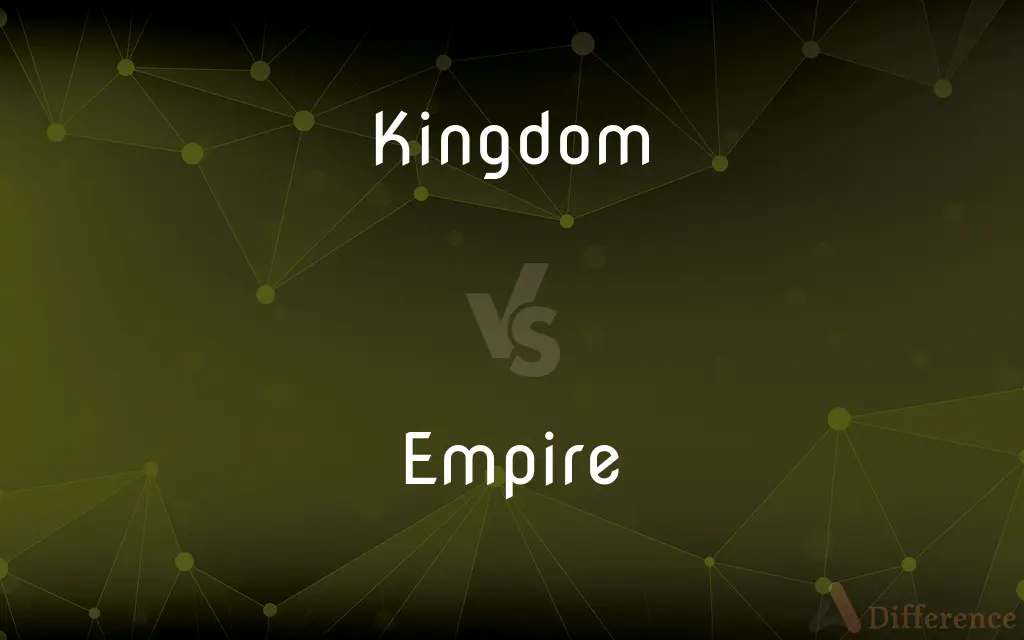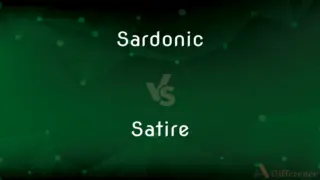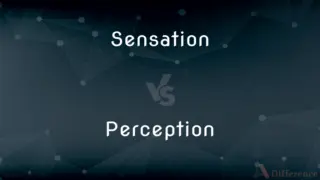Kingdom vs. Empire — What's the Difference?
By Tayyaba Rehman & Maham Liaqat — Updated on March 15, 2024
A kingdom is ruled by a king or queen and is typically a single nation, while an empire encompasses multiple nations under a single sovereign authority.

Difference Between Kingdom and Empire
Table of Contents
ADVERTISEMENT
Key Differences
Kingdoms are political realms where a monarch, such as a king or queen, serves as the head of state, often ruling over a single nation or territory with a relatively homogenous population and culture. Empires, on the other hand, extend their dominion across multiple nations or territories, bringing together diverse cultures and peoples under a single sovereign power, which could be an emperor, empress, or another monarch. This distinction highlights the scale and diversity of control, with empires often representing larger, more complex political structures than kingdoms.
The governance of a kingdom is typically centralized around the monarch and their court, with a focus on managing the affairs of a singular nation or people. Empires require more intricate administrative systems to manage the diverse regions and cultures within their domain, often implementing a hierarchical or federated system of governance to maintain order and facilitate control over vast distances.
Kingdoms have often been the building blocks of empires. As a kingdom expands its territory through conquest, marriage alliances, or other means, it may transform into an empire, encompassing a variety of previously independent states or territories under its rule. This evolution from kingdom to empire reflects the dynamic nature of political power and territorial control throughout history.
Kingdoms may have a more unified national identity, with shared customs, languages, and traditions. Empires, due to their diversity, can foster a blend of cultures and identities, leading to a more cosmopolitan society. However, this diversity can also pose challenges for cohesion and may require the implementation of policies that either encourage cultural integration or enforce a dominant culture over subjugated peoples.
In terms of international relations, kingdoms might focus on diplomacy, trade, and defense within a more localized or regional context. Empires, with their broader reach, engage in global diplomacy, exerting influence over a wide range of territories and peoples. Their interactions on the international stage are often driven by the need to secure their vast territories, manage diverse subject populations, and compete with other great powers for dominance.
ADVERTISEMENT
Comparison Chart
Definition
A realm ruled by a king or queen, typically a single nation.
A sovereign state comprising multiple nations or territories.
Head of State
King or Queen
Emperor, Empress, or other monarchs
Territorial Scope
Single nation or territory
Multiple nations or territories
Governance
Centralized around the monarch
Complex administrative systems
Cultural Identity
More homogenous
Diverse, cosmopolitan
Historical Evolution
Can evolve into an empire through expansion
Formed by consolidating multiple kingdoms or territories
Diplomatic Focus
Regional diplomacy and defense
Global diplomacy and influence
Administrative Complexity
Relatively simpler
More intricate and hierarchical
Identity
Unified national identity
Blend of cultures and identities
Example
The Kingdom of Norway
The Roman Empire
Compare with Definitions
Kingdom
A state ruled by a monarch.
The Kingdom of Sweden is governed by a constitutional monarchy.
Empire
Engages in global diplomacy.
The Mongol Empire established trade routes across Eurasia.
Kingdom
Can be part of an empire.
The Kingdom of Bohemia was a part of the Holy Roman Empire.
Empire
Known for its administrative complexity.
The Ottoman Empire used a millet system for managing diverse populations.
Kingdom
Often characterized by a unified culture.
The Kingdom of Thailand has a rich cultural heritage centered around its monarchy.
Empire
Culturally diverse due to its wide reach.
The Austro-Hungarian Empire encompassed numerous ethnic groups.
Kingdom
Focuses on the rule of a singular nation.
The Kingdom of Bhutan is known for its measure of Gross National Happiness.
Empire
A sovereign state with multiple territories under a single authority.
The British Empire once spanned continents.
Kingdom
Engages in regional diplomacy.
Historical kingdoms often formed alliances through marriage.
Empire
Often results from conquest or unification.
The Roman Empire expanded through military conquests.
Kingdom
A country, state, or territory ruled by a king or queen
The Kingdom of the Netherlands
Empire
An empire is a sovereign state made up of several territories and peoples subject to a single ruling authority, often an emperor. A state can become an empire either by a narrow definition through having an emperor and being named as such, or by a broad definition as stated above as an aggregate territory under the rule of supreme authorities such as the Roman Empire.
Kingdom
The spiritual reign or authority of God.
Empire
An extensive group of states or countries ruled over by a single monarch, an oligarchy, or a sovereign state
The Roman Empire
Kingdom
Each of the three traditional divisions (animal, vegetable, and mineral) in which natural objects have conventionally been classified.
Empire
A large commercial organization owned or controlled by one person or group
Her business empire grew
Kingdom
A political or territorial unit ruled by a sovereign.
Empire
Denoting a style of furniture, decoration, or dress fashionable chiefly during the First Empire in France. The decorative style was neoclassical but marked by an interest in Egyptian and other ancient motifs.
Kingdom
The eternal spiritual sovereignty of God or Christ.
Empire
Denoting produce from the Commonwealth.
Kingdom
The realm of this sovereignty.
Empire
Of, relating to, or characteristic of a neoclassic style, as in clothing or the decorative arts, prevalent in France during the early 1800s.
Kingdom
A realm or sphere in which one thing is dominant
The kingdom of the imagination.
Empire
A variety of apple having dark red skin and white flesh.
Kingdom
In the Linnean taxonomic system, the highest taxonomic category into which organisms are grouped, based on fundamental similarities and common ancestry. One widely used taxonomic system designates five or six such groups
Animals, plants, fungi, protists, and prokaryotes (often divided into bacteria and archaea). Other systems divide organisms into domains (eukaryotes, bacteria, and archaea) that replace or rank above kingdoms.
Empire
A political unit having an extensive territory or comprising a number of territories or nations and ruled by a single supreme authority.
Kingdom
One of the three main divisions (animal, vegetable, and mineral) into which natural organisms and objects have traditionally been classified.
Empire
The territory included in such a unit.
Kingdom
A realm having a king and/or queen as its actual or nominal sovereign.
Empire
An extensive enterprise under a unified authority:a publishing empire.
Kingdom
A realm, region, or conceptual space where something is dominant.
The kingdom of thought
The kingdom of the dead
Empire
Imperial or imperialistic sovereignty, domination, or control:the extension of empire to distant lands.
Kingdom
(taxonomy) A rank in the classification of organisms, below domain and above phylum; a taxon at that rank (e.g. the plant kingdom, the animal kingdom).
Empire
A political unit, typically having an extensive territory or comprising a number of territories or nations (especially one comprising one or more kingdoms) and ruled by a single supreme authority.
The Russian empire
Kingdom
The rank, quality, state, or attributes of a king; royal authority; sovereign power; rule; dominion; monarchy.
Thy kingdom is an everlasting kingdom.
When Jehoram was risen up to the kingdom of his father, he strengthened himself.
Empire
A political unit ruled by an emperor or empress.
The Empire of Vietnam was a short-lived client state of Japan governing Vietnam between March 11 and August 23, 1945.
Kingdom
The territory or country subject to a king or queen; the dominion of a monarch; the sphere in which one is king or has control.
Unto the kingdom of perpetual night.
You're welcome,Most learned reverend sir, into our kingdom.
Empire
The group of states or other territories that owe allegiance to an imperial power (foreign to them), when distinguished from the native territory of that power; imperial possessions.
Kingdom
An extensive scientific division distinguished by leading or ruling characteristics; a principal division; a department; as, the mineral kingdom. In modern biology, the division of life into five kingdoms is widely used for classification.
Empire
An expansive and powerful enterprise under the control of one person or group.
The McDonald's fast food empire
Kingdom
A domain in which something is dominant;
The untroubled kingdom of reason
A land of make-believe
The rise of the realm of cotton in the south
Empire
(Absolute) control, dominion, sway.
Kingdom
A country with a king as head of state
Empire
Alternative case form of Empire.
Kingdom
The domain ruled by a king or queen
Empire
Supreme power; sovereignty; sway; dominion.
Over hell extendHis empire, and with iron scepter rule.
Kingdom
A monarchy with a king or queen as head of state
Empire
The dominion of an emperor; the territory or countries under the jurisdiction and dominion of an emperor (rarely of a king), usually of greater extent than a kingdom, always comprising a variety in the nationality of, or the forms of administration in, constituent and subordinate portions; as, the Austrian empire.
Empire carries with it the idea of a vast and complicated government.
Kingdom
One of seven biological categories: Monera or Protoctista or Plantae or Fungi or Animalia
Empire
Any dominion; supreme control; governing influence; rule; sway; as, the empire of mind or of reason.
Another force which, in the Middle Ages, shared with chivalry the empire over the minds of men.
Kingdom
A basic group of natural objects
Empire
The domain ruled by an emperor or empress
Empire
A group of countries under a single authority;
The British empire
Empire
A monarchy with an emperor as head of state
Empire
A group of diverse companies under common ownership and run as a single organization
Empire
An eating apple that somewhat resembles a McIntosh; used as both an eating and a cooking apple
Common Curiosities
Do all empires have emperors?
While many empires are ruled by emperors, the term "empire" can also refer to territories ruled by monarchs with different titles, depending on historical and cultural contexts.
What is the main difference between a kingdom and an empire?
The main difference lies in their scale and diversity, with kingdoms typically ruling over a single nation and empires over multiple nations or territories.
Can a kingdom become an empire?
Yes, through expansion and the acquisition of additional territories, a kingdom can evolve into an empire.
What role does diplomacy play in the survival of kingdoms and empires?
For kingdoms, diplomacy often focuses on regional alliances and defense, while for empires, it involves global strategies to maintain control over vast territories and influence international relations.
How does the governance of an empire differ from that of a kingdom?
Empires typically have a more hierarchical or federated system of governance to manage the complex socio-political landscape of their diverse territories.
Why do empires often have diverse cultures?
Due to their conquests and unification of multiple territories, empires encompass a variety of cultures, languages, and peoples.
Can an empire consist of kingdoms?
Yes, empires can and often do consist of kingdoms as part of their territories, with local monarchs ruling under the overarching authority of the emperor.
How do kingdoms and empires manage their territories?
Kingdoms generally have a more centralized governance around the monarch, while empires require more complex administrative systems to manage diverse territories.
How do cultural identities within empires and kingdoms differ?
Kingdoms tend to have more homogenous cultural identities, while empires feature a blend of cultures and identities due to their diverse populations.
What historical factors contribute to the transformation of kingdoms into empires?
Factors include military conquest, strategic marriages, economic dominance, and the effective administration of conquered territories.
Share Your Discovery

Previous Comparison
Sardonic vs. Satire
Next Comparison
Sensation vs. PerceptionAuthor Spotlight
Written by
Tayyaba RehmanTayyaba Rehman is a distinguished writer, currently serving as a primary contributor to askdifference.com. As a researcher in semantics and etymology, Tayyaba's passion for the complexity of languages and their distinctions has found a perfect home on the platform. Tayyaba delves into the intricacies of language, distinguishing between commonly confused words and phrases, thereby providing clarity for readers worldwide.
Co-written by
Maham Liaqat















































